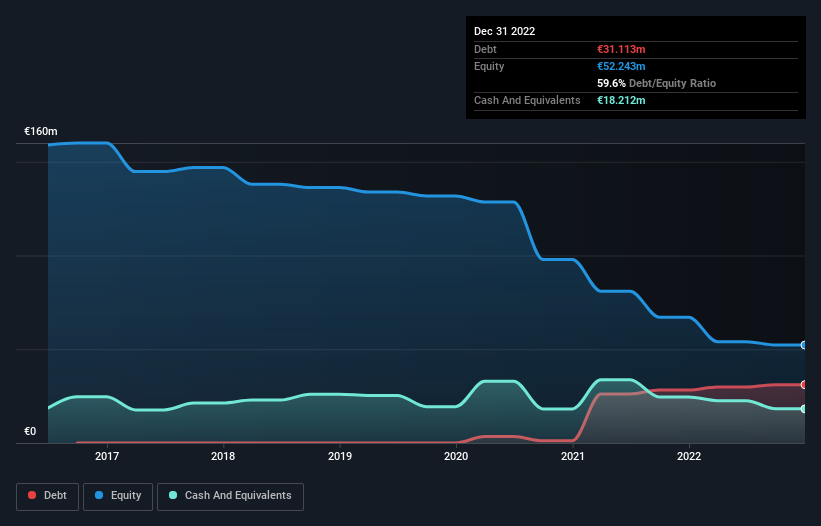Some say volatility, rather than debt, is the best way to think about risk as an investor, but Warren Buffett famously said that 'Volatility is far from synonymous with risk.' When we think about how risky a company is, we always like to look at its use of debt, since debt overload can lead to ruin. Importantly, Hostelworld Group plc (LON:HSW) does carry debt. But should shareholders be worried about its use of debt?
What Risk Does Debt Bring?
Debt and other liabilities become risky for a business when it cannot easily fulfill those obligations, either with free cash flow or by raising capital at an attractive price. Ultimately, if the company can't fulfill its legal obligations to repay debt, shareholders could walk away with nothing. However, a more usual (but still expensive) situation is where a company must dilute shareholders at a cheap share price simply to get debt under control. Of course, debt can be an important tool in businesses, particularly capital heavy businesses. The first step when considering a company's debt levels is to consider its cash and debt together.
See our latest analysis for Hostelworld Group
How Much Debt Does Hostelworld Group Carry?
The image below, which you can click on for greater detail, shows that at December 2022 Hostelworld Group had debt of €31.1m, up from €28.2m in one year. However, it does have €18.2m in cash offsetting this, leading to net debt of about €12.9m.

How Healthy Is Hostelworld Group's Balance Sheet?
Zooming in on the latest balance sheet data, we can see that Hostelworld Group had liabilities of €13.9m due within 12 months and liabilities of €40.3m due beyond that. Offsetting these obligations, it had cash of €18.2m as well as receivables valued at €2.00m due within 12 months. So its liabilities outweigh the sum of its cash and (near-term) receivables by €34.0m.
Of course, Hostelworld Group has a market capitalization of €180.2m, so these liabilities are probably manageable. Having said that, it's clear that we should continue to monitor its balance sheet, lest it change for the worse. When analysing debt levels, the balance sheet is the obvious place to start. But it is future earnings, more than anything, that will determine Hostelworld Group's ability to maintain a healthy balance sheet going forward. So if you're focused on the future you can check out this free report showing analyst profit forecasts.
In the last year Hostelworld Group wasn't profitable at an EBIT level, but managed to grow its revenue by 312%, to €70m. When it comes to revenue growth, that's like nailing the game winning 3-pointer!
Caveat Emptor
While we can certainly appreciate Hostelworld Group's revenue growth, its earnings before interest and tax (EBIT) loss is not ideal. Indeed, it lost €9.8m at the EBIT level. When we look at that and recall the liabilities on its balance sheet, relative to cash, it seems unwise to us for the company to have any debt. Quite frankly we think the balance sheet is far from match-fit, although it could be improved with time. Another cause for caution is that is bled €5.5m in negative free cash flow over the last twelve months. So suffice it to say we do consider the stock to be risky. The balance sheet is clearly the area to focus on when you are analysing debt. However, not all investment risk resides within the balance sheet - far from it. For instance, we've identified 2 warning signs for Hostelworld Group that you should be aware of.
If, after all that, you're more interested in a fast growing company with a rock-solid balance sheet, then check out our list of net cash growth stocks without delay.
Valuation is complex, but we're here to simplify it.
Discover if Hostelworld Group might be undervalued or overvalued with our detailed analysis, featuring fair value estimates, potential risks, dividends, insider trades, and its financial condition.
Access Free AnalysisHave feedback on this article? Concerned about the content? Get in touch with us directly. Alternatively, email editorial-team (at) simplywallst.com.
This article by Simply Wall St is general in nature. We provide commentary based on historical data and analyst forecasts only using an unbiased methodology and our articles are not intended to be financial advice. It does not constitute a recommendation to buy or sell any stock, and does not take account of your objectives, or your financial situation. We aim to bring you long-term focused analysis driven by fundamental data. Note that our analysis may not factor in the latest price-sensitive company announcements or qualitative material. Simply Wall St has no position in any stocks mentioned.
About LSE:HSW
Hostelworld Group
Operates as an online travel agent focused on the hostel market worldwide.
Excellent balance sheet with reasonable growth potential.
Similar Companies
Market Insights
Community Narratives



